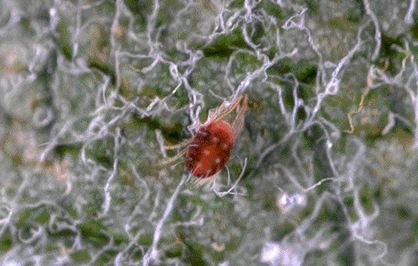
Protected crops such as tomatoes, aubergines, strawberries and ornamentals are plagued with red spider mites that damage both yield and visual appearance, even in low populations; their control using ICM techniques is essential to meet the exacting standards of the retail outlets and supermarkets. Neil Helyer, ICM specialist for Fargro, has found the contact and translaminar acting acaricide Borneo to be an essential component in Integrated Pest Management situation, as it offers good persistence and safety to predators and pollinators.
"Spider mites cause such serious cosmetic and economic damage to ornamentals and yield damage in other protected crops such as aubergines, strawberries and tomatoes and I have found Borneo a very welcome addition to our armoury in these crops. But you need to time its application correctly in order to get the best results" says Neil Helyer.
"For example in protected strawberries Borneo is applied just before first picking, keeping within its three-day Harvest Interval but benefiting from its 4 to 6 weeks protection. With a normal picking period of six to eight weeks, Borneo starts off the control programme which can then be augmented by the introduction of predators, Phytoseiulus persimilis, which gives good curative activity of spider mites or Amblyseius californicus, which can work with the higher temperatures. Growers need a specific licence for the latter, but Borneo can be used quite safely with either predators. We are so impressed with Borneo that we are hoping to apply for a SOLA in raspberries, where spider mites can cause severe damage to canes," explains Neil.
"In protected tomatoes, Borneo is used as and when it is needed, but its three-day Harvest Interval is important as you can spray on a Friday and pick on the Monday. It is also perfectly safe to bumblebees that are introduced to pollinate the crop and is photostable, giving additional protection for several weeks following treatment" he says.
Neil points out that aubergines are very susceptible to spider mites. "As a crop, they are virtual magnets for these pests! Here it is Borneo’s long residual activity of the leaf and its persistence, which is greater than other acaricides, that makes it so useful. Borneo is translaminar, which means that it moves through the leaf from the sprayed surface through to the opposite side. It means that it will control mites on the undersides of the leaf."
Neil Helyer has also had very good results with Borneo in protected ornamentals, for which it has a SOLA. "In this crop it is best applied early on to allow it to control the red spider mites as they emerge from their diapause. The extended persistence of Borneo will make sure that it will control the extended emergence of the spider mites. Back up to Borneo can be provided by the use of predatory mites, Phytoseiulus. In chrysanthemums, Borneo is used once for each crop, with many growers multi-cropping up to five crops per year. The plants are brought in as 10 cms cuttings and grow to over one metre in height. Here Borneo is usually applied in weeks 4 to 6 out of a 10 week growing period, to protect as much foliage as possible."
Neil advises growers to use Borneo at the best timing for each crop. "It is best to apply Borneo as a high volume spray to get the best coverage. It is also advantageous to keep humidity high to allow the necessary two to three hours of leaf wetness for maximum leaf penetration."
Dr David Stormonth, Technical Manager of Interfarm UK points out that etoxazole, the active ingredient in Borneo, works by inhibiting chitin production, which affects moulting and growing in mites. "This results in the effective control of eggs and all immature stages of the spider mites. It also has an adverse effect on egg production in adult females, through its chitin inhibition, making the female sterile. Etoxazole is from the oxaline group of insecticides and shows no cross-resistance to any other acaricides."
"Borneo is active against the two main species of spider mite – the Two-spotted Spider Mite (Tetranychus urticae) and the Fruit Tree Spider Mite (Panonychus ulmi). It should be applied at a dose rate of 25-30 mls per 100 litres of water in a minimum water volume of 500 litres per hectare," says David Stormonth.
Developed by Sumitomo Chemical Company and marketed in UK by its affiliate Interfarm UK Ltd, Borneo contains 110 gms/litre etoxazole formulated as a suspension concentrate. It is recommended for the control of spider mites on protected tomatoes and aubergines as well as having SOLA’s on protected ornamentals and strawberries. One application of Borneo is allowed per crop. It is packed in 250 mls packs.
Growers need to obtain a copy of the notice of approval to use Borneo in strawberries and ornamentals via the Chemicals Regulation Directorate (CRD) web site, ADAS offices, the HDC or NFU. Growers are advised to test a small area of crop prior to commercial use.
For further comment and information, please contact Dr. David Stormonth, Technical Manager, Interfarm UK Ltd. on 01354 741414 or 07818 036506 (mobile) or via e-mail david.stormonth@interfarm.co.uk
